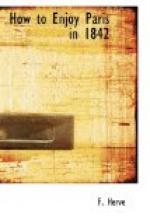no other cloak than a chlamyde embroidered with gold,
your girdle must be ornamented with precious stones,
and gold must sparkle even upon your shoes, and on
the cane which you carry. O France! if you do
not abandon such luxurious extravagance, you will
lose your courage and your country.” Hugh
Capet, who became king of France in 987, fixed his
residence at Paris, thus again constituting it the
capital of the kingdom, and his son and successor Robert,
being a strict devotee, built and repaired several
churches which had been greatly injured by the Normans,
and Paris began in his reign to assume an appearance
of improvement, which continued until it received a
check from an ill-timed joke of Philippe the First,
who made a satirical remark upon William the Conqueror
of England having become rather unwieldy, which so
provoked that choleric monarch that he laid waste a
great portion of Philippe’s dominions; when his
progress was checked by his falling from his horse,
which occasioned his death and thus delivered Philippe
from a most powerful enemy. In the following reign,
that of Lewis the Fat, learning began to make considerable
progress, and the colleges of Paris to acquire a high
celebrity, and amongst the professors whose reputation
was of the highest, was Abelard, no one before having
succeeded in attracting so many pupils. In 1118
he established a school in Paris, but from a variety
of persecutions which he endured, he was frequently
obliged to retire to different parts of France; his
unfortunate attachment to Heloise is but too well known,
and she ultimately became the abbess of a convent
which Abelard founded at Nogent-sur-Seine, and which
he called Paraclet. The number of pupils at one
time are stated to have been three thousand, and he
instructed them in the open air; it is also asserted
that of his followers fifty became either bishops
or archbishops, twenty cardinals, and one pope, Celestin
II. In fact the fame of Abelard had arrived at
such an altitude that he was the means of giving a
new era to Paris, which was designated the city of
letters; other professors became highly celebrated,
and some authors pretend that the immense concourse
of students who ultimately flocked to Paris, exceeded
the number of the inhabitants, and there was much
difficulty in finding the means of lodging them; how
great must have been the anxiety for learning, as
the masters were exceedingly brutal and imparted their
knowledge to the pupil by the force of blows, which
at length deterred many students from placing themselves
under the charge of such preceptors. This extraordinary
desire for obtaining education appears to have been
almost a sudden impulse, as the immediate descendants
of Hugh Capet could not read or write, but were obliged
to make a mark as the signature to their edicts, whilst
those who possessed that accomplishment were styled
clerks. Although much brilliance was shed over
the reign of Louis the Sixth by the learning of Abelard
and the professors who followed him, yet soon after




